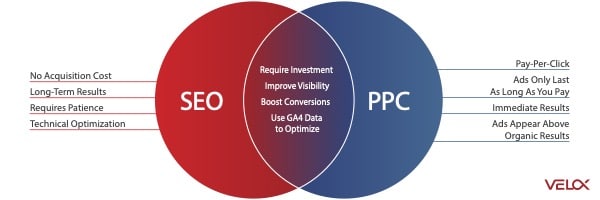
May 23, 2023
5 Advantages of PPC and SEO Working Together
If there’s one thing we know about digital marketers, it’s that they love to argue over the pros and cons of PPC and organic SEO.
Many bloggers demonstrate a clear preference for one method. Some go even further, advising marketing managers to avoid one or the other at all costs.
Does it need to be a choice? After all, organic SEO and PPC are both tools that can help grow your brand online, and each offers distinct advantages in certain circumstances.
Rather than performing mental gymnastics to explain why one is superior, there’s far more value in identifying how you can get the most mileage out of each strategy and how PPC and SEO working together can achieve exponentially greater results.
Here’s how to use SEO and PPC together to propel your business to new heights.
PPC vs SEO: A Brief Refresher

Before we get into the benefits of SEO and PPC working together, it’s essential to first understand their similarities and differences. While both are effective digital marketing tactics, there are some crucial factors that distinguish SEO vs PPC.
PPC, an acronym for Pay Per Click, involves advertisers working directly with a search engine or social media platform, like Google or Instagram, to have their ads displayed to certain audiences. The advertiser only pays if somebody clicks on their ad.
When you hear the term PPC, you should think of targeted ads that deliver immediate results. PPC includes search and display advertising as well as forms of remarketing and other elements.
Direct control is one of the chief advantages of PPC. You set your bid amounts, define audiences, and write and edit your copy. As soon as you launch the campaign, Google starts displaying, which means well-executed PPC campaigns can boost site traffic almost immediately.
SEO is short for Search Engine Optimization. It’s a process that involves a number of techniques that can be organized into three distinct categories:
- Technical SEO refers to work that directly impacts your site’s performance. But this isn’t just mobile-friendliness and site speed. Technical SEO also includes security, linking structure, crawlability, and more.
- On-Site SEO is all about your pages and the factors that impact their rankings on search engine results pages (SERPs). On-site SEO (also referred to as on-page SEO) involves creating helpful, informative content that solves problems or answers questions for your intended audience.
- Off-Site SEO, conversely, is everything you can do elsewhere on the internet to boost the performance of your revenue-driving pages and your site as a whole. The most significant element of off-site SEO is building a backlink profile. This involves getting other sites to link to strategic keywords on your most important pages, boosting your site’s reputation and demonstrating authority to search engines.
Whereas PPC is a form of paid advertising, SEO refers to work you can do to improve your site’s performance organically. By enhancing your site’s authority and optimizing your pages with carefully considered keywords and helpful content, you can move your site higher in SERPs.
Think of PPC as a spigot you can turn on and off at will. You’ll start seeing results as soon as your campaign begins, and they’ll dry up when you stop spending.
SEO, on the other hand, takes considerable time to make an impact on your performance. Often, you won’t see results for 4 to 6 months.
However, the benefits of SEO will outlive the campaign itself since they’re organic instead of paid. In addition, organic results enjoy higher CTRs than PPC results that appear on the same search results page.
If you had to choose between organic vs paid search, your choice might come down to a unique set of circumstances, including the state of your business, your goals, and how quickly you’d like to reach said goals.
However, brands that leverage both methods simultaneously stand to realize outsized results compared to organizations that choose only one approach.
With that in mind, let’s look at some examples of how PPC and SEO work together to create maximum results for your business.
How Do PPC and SEO Work Together?
Spending efficiently usually means you won’t go all-in with both PPC and SEO in the long run. However, strategically combining elements of both can offer remarkably better results than using one strategy on its own.
So, how do SEO and PPC work together? Here are five ways to integrate various components of PPC and SEO in order to compound their effectiveness.
Use PPC for Immediate Visibility While Your SEO Campaign Ramps Up
With Google’s reinvention as a discovery engine, increasingly crowded SERPs, and the introduction of AI-powered, chat-oriented search tools, some digital marketers are asking the question: Is SEO Dead in 2023?
Spoiler alert: SEO is more important than ever and remains the single most effective way to drive traffic to your site and enjoy enduring results.
But one of the most common objections to SEO is the time it takes for these results to materialize.
The last thing you want to do, especially as an emerging brand, is let SEO cost and your need for immediate gains prevent you from devoting marketing spend to organic search. Fortunately, PPC can help.
Starting with PPC and SEO simultaneously is the best way to attain the visibility and longevity your brand needs to succeed online. As your SEO campaign gains traction over the first several months, PPC can put you front-and-center on SERPs for the keywords that matter most to your business, delivering an immediate influx of traffic.
Eventually, well-executed SEO strategies yield exponential results, allowing you to scale back your PPC spend or reallocate it to focus on new keywords.
Put simply, PPC will help you win the sprint, while SEO positions you to win gold in the marathon.
PPC Is a Valuable Testing Ground for SEO Keywords
To keep your SEO campaign as efficient as possible, you want to identify your target keywords at the outset and stick with them until your KPIs reach the stratosphere. Pivoting keywords mid-campaign costs time and marketing spend you can’t recoup.
As such, there’s immense value in using Google Ads to test keyword performance before deciding to include it in your organic SEO efforts.
You can take your A/B testing beyond keywords, too. Google Ads is the perfect tool to experiment with different landing pages and ad copy as you work to identify the secret sauce that will enhance your CTRs, site traffic, and conversions.
Analytics Insights Help You Optimize Landing Pages and Ad Spend
The more information you can learn about your users and customer journeys, the better you can optimize your site for SEO success. That’s why every successful SEO campaign leans heavily on data collected from Google Ads and within Google Analytics 4.
Google Analytics 4 includes new tools that give digital marketers unprecedented comprehension of user acquisition, engagement, retention, and other metrics. When you augment your GA4 insights with more targeted data from Google Ads, you’ll have more clarity than ever before.
This tactic goes beyond simple results. It’s an example of how SEO and PPC work together to give you a robust understanding of where your users come from, how they engage with your brand online, and what you can do to increase your competitiveness.
As you start to see your organic search campaign pay dividends for certain keywords, you can redirect your PPC spend away from those keywords to strengthen results in new or underperforming segments. This way, you can continually optimize your ROAS and avoid overspending on keywords where your organic SEO is already doing most of the work.
RELATED: What Every SEO Marketer Needs to Know About Google E-E-A-T
Experience Superior Remarketing From PPC and SEO Working Together in Tandem
In another example of how the combination of PPC and SEO working together goes far beyond metrics, using these tools in tandem is key to getting the best remarketing results.
Suppose a user goes to Google to research products like the ones you offer on your website. They go from the SERP—where your landing page now ranks among the top results, thanks to your organic SEO campaign—to your site. There, they review your informative product descriptions or one of the helpful how-to guides on your blog, then leave.
A few days later, when the user returns to the web to resume their journey, your remarketing PPC ads effectively demonstrate why your products outperform the competition, and the user returns to your site for a transaction.
In addition to the previously discussed benefits of SEO and PPC working together, it’s also a particularly effective method for shoring up your conversion paths and increasing conversions.
Box Out the Competition on SERPs
What’s better than an SEO campaign that pushes your revenue-driving pages to the top of organic search results? Taking up as much SERP real estate as possible, of course.
You can do this by running PPC ads in parallel with your SEO campaign, putting your paid ads directly above your organic links for a given keyword or search query.
This has multiple effects. First, and perhaps most obviously, it reduces the visibility of your competition, which tends to improve your CTRs while reducing theirs. In addition, it elevates your brand’s reputation and authority in the minds of searchers, making them more likely to turn to your business for answers and solutions—including your products and services.
Now that you’ve seen examples of how PPC and SEO work together to achieve exponential results, it’s important to note that achieving the right blend of PPC and SEO can be challenging. True SERP dominance and dependable remarketing require proven expertise, thorough research, and careful implementation, all of which can come at a cost.
If establishing a winning digital presence and growing exponentially is important to your brand, you’ll get the greatest ROI by partnering with an experienced SEO and PPC digital marketing agency.
VELOX Media Delivers a Winning Fusion of PPC and SEO
Whether you’re looking to get started with PPC, SEO, or a combination of the two, VELOX Media is ready to take your brand to the next level with a bespoke, ROI-focused digital marketing campaign.
As a Google Premier Partner, VELOX ranks among the top 3% of digital marketing agencies globally by driving exponential growth and consistently exceeding client expectations. In addition to leveraging our unsurpassed knowledge of how SEO and PPC work together, we’re always innovating to help clients smash KPIs.
Ready to realize the advantages of SEO and PPC working together? Contact VELOX today and see what a smarter digital strategy looks like.